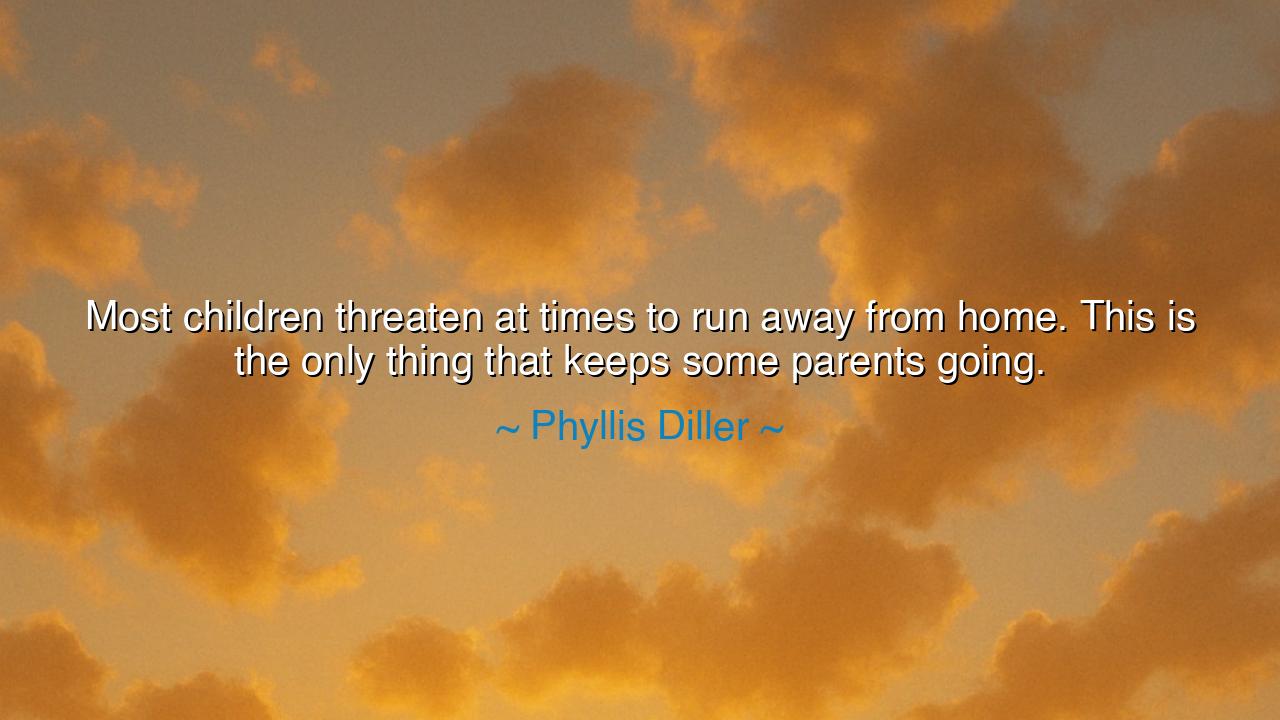
Most children threaten at times to run away from home. This is
Most children threaten at times to run away from home. This is the only thing that keeps some parents going.






When Phyllis Diller quipped, “Most children threaten at times to run away from home. This is the only thing that keeps some parents going,” she clothed profound truth in the garments of laughter. Beneath her jest lies the bittersweet rhythm of family life — the endless struggle between love and frustration, between the chaos of raising children and the deep, unspoken devotion that endures beneath it. Like many of Diller’s words, this saying is humorous only because it is so achingly real. It speaks of the human paradox: that those we love most can exhaust us most completely, and yet their absence is the one thing we could never bear.
In this statement, Diller transforms the ordinary trials of parenthood into a mirror of ancient wisdom. Her humor does not mock family life; it sanctifies it. For every parent has known that moment of exasperation — the slammed door, the tantrum, the rebellious cry of a child declaring independence — and within that moment, a secret thought arises: perhaps a little silence would not be so bad. Yet, even as that thought flickers, another follows close behind — the aching terror of emptiness, the quiet that would fall if the child truly left. Thus, in jest, Diller unveils the great tension of love: we wish for peace, but not at the price of the ones who give our lives meaning.
The origin of her humor springs from the ancient well of truth that comedians and philosophers alike have drawn from — the idea that laughter is often the most merciful form of wisdom. In Greece, Aristophanes used comedy to expose the follies of men; in Rome, Horace wielded wit like a scalpel, cutting through hypocrisy. So too did Phyllis Diller, standing in her time as a modern oracle of domestic truth. Her laughter was not cruelty but compassion — an acknowledgment that parenthood, like all great callings, demands both endurance and grace.
Consider, for a moment, the tale of King Lear, the father who divided his kingdom among his daughters, only to learn too late the cost of vanity and misunderstanding. His story, though tragic, mirrors the everyday pain of parents and children: the longing to be appreciated, the miscommunication between generations, the heartbreak of distance. In Diller’s quote, this tragedy is softened by humor, yet the essence remains. The child’s rebellion and the parent’s weariness are not enemies but two sides of the same bond. The threat of departure makes love visible; it reminds both parent and child that they are bound not by convenience, but by the invisible threads of shared history and affection.
There is also wisdom here about gratitude and perspective. Diller’s humor teaches that even in our most trying relationships, laughter can be the bridge that saves us. The parent who laughs at the child’s threat to “run away” is not mocking rebellion but acknowledging the absurd, tender dance of family life — where anger and affection intertwine, and where forgiveness grows from familiarity. To laugh is to release the pressure, to remember that beneath the noise and struggle lies love’s endurance.
But let this teaching not be mistaken for cynicism. Diller’s humor, though sharp, is born of love. She reminds us that the trials of family life are not punishments but privileges. The chaos of children, the exasperation of their defiance, the weariness of long days — these are the fires in which patience and compassion are forged. The very moments that drive parents to exclaim, “I can’t take this anymore!” are the same moments that make their lives full. The laughter that follows is a form of resilience, a way to endure love’s labor without bitterness.
Therefore, O listener, learn this lesson: laughter is a form of wisdom. When life overwhelms you — when those you love most test your strength — remember Diller’s truth. Laugh not to escape pain, but to soften it. Smile not because it is easy, but because it is necessary. In every home, there will be threats of leaving and sighs of exhaustion, but these are the sounds of life itself — the proof that love still burns, that hearts still grow. For when the house falls silent, and the children have truly gone, it is that noise, that struggle, that laughter, which the soul will long for most.
And so, let humor be your shield and gratitude your guide. For in the laughter of Phyllis Diller, one hears not mockery, but the eternal song of love — messy, imperfect, and endlessly alive.






AAdministratorAdministrator
Welcome, honored guests. Please leave a comment, we will respond soon